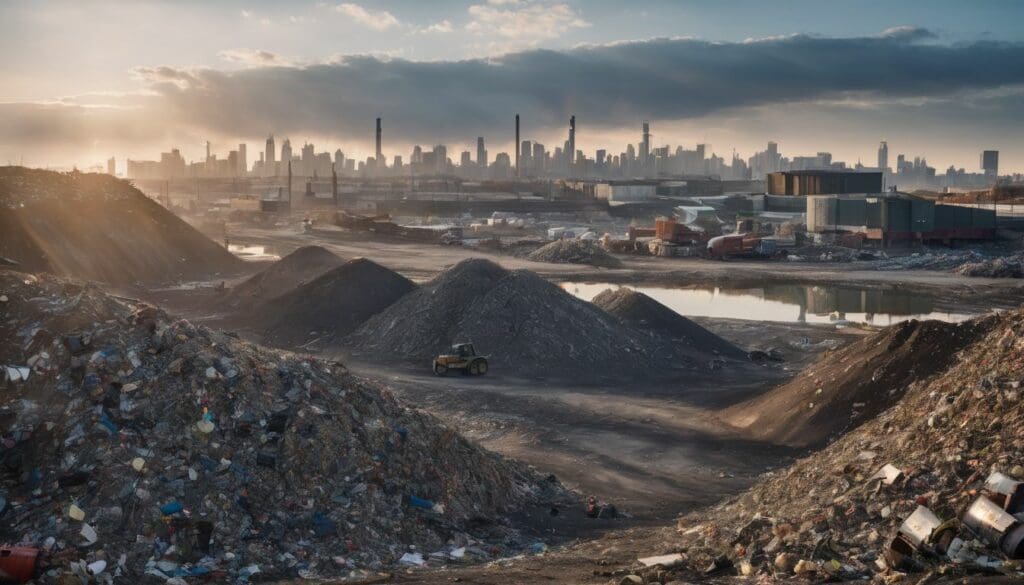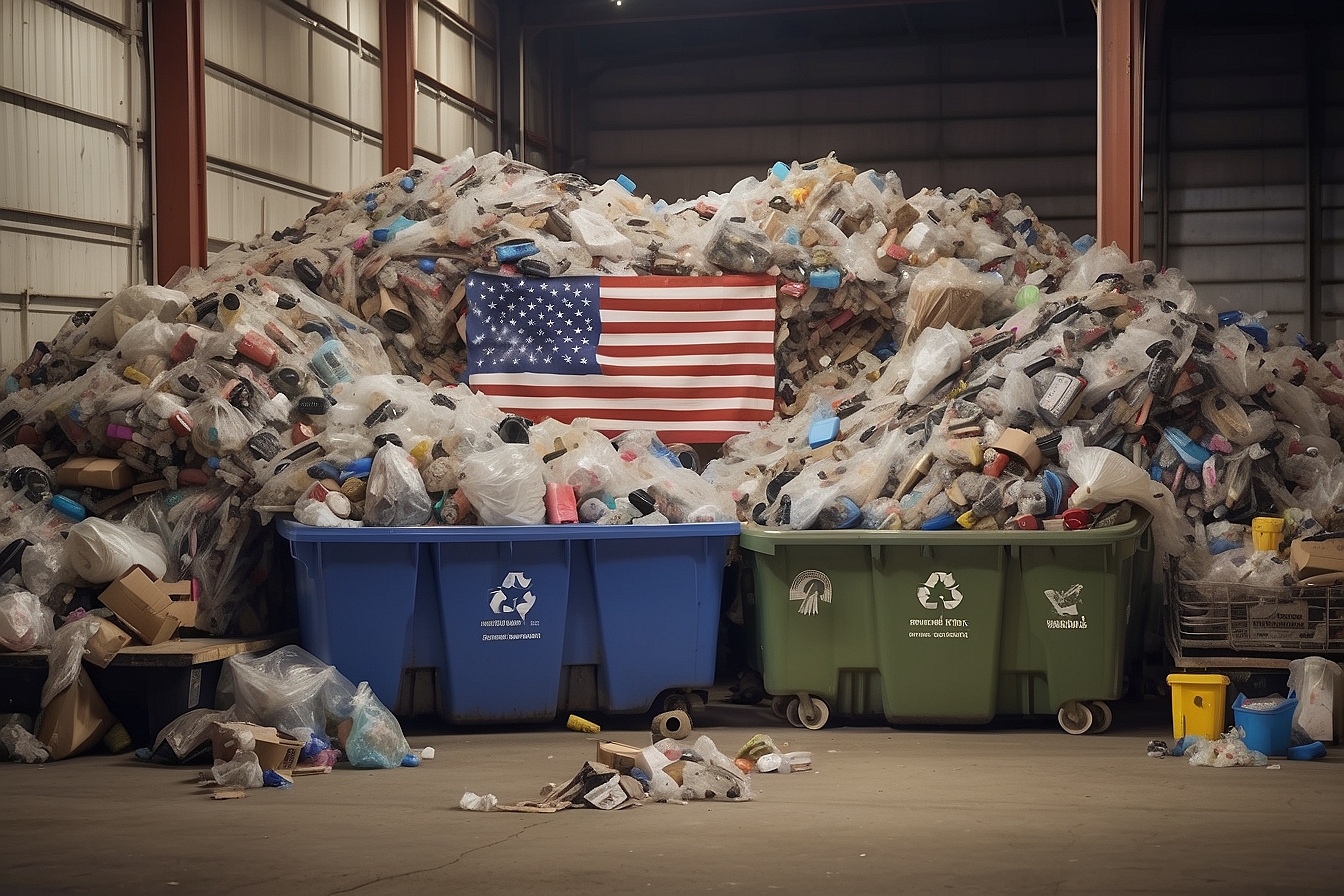Industrial waste often presents a rather tricky conundrum, with firms caught in the tussle between forging ahead economically and treading lightly on our precious environment. The repercussions of neglecting proper waste management are all too familiar, laid bare for us to witness time and again.
However, enlightenment isn’t far-flung—we’re now equipped with a wealth of research that points towards viable solutions. Our blog seeks to navigate through these complexities, uncovering creative ways in which industrial leftovers can be transformed into treasures of utility.
Join us on this enlightening journey as we endeavour to effectuate meaningful change by looking at old problems through new lenses. Let’s embark on this path together!
Key Takeaways
- Industrial waste management struggles with outdated disposal methods, causing pollution and health risks.
- The scarcity of resources like funding and technology slows down the progress towards better waste solutions.
- Circular economy models and industrial symbiosis can transform industrial waste into valuable resources.
- Technological advancements are crucial for efficient recycling and reducing the environmental footprint of industries.
- Active efforts to address industrial waste challenges will lead to sustainable practices benefiting both environment and economy.
Challenges of Industrial Waste Management
The management of industrial waste presents several challenges, including the lack of proper disposal methods and the resulting environmental pollution and health risks. Furthermore, limited availability of resources adds to these challenges, making it difficult to effectively manage industrial waste.
Lack of proper waste disposal methods
We face a real problem with the current state of waste disposal methods for industrial waste. Many industries still rely on landfills and incineration, which lead to environmental pollution and can put our health at risk.
As we strive towards sustainability, it’s clear that outdated practices aren’t just harmful; they’re also ineffective in dealing with the sheer volume of waste generated by economic growth and industrialisation.
Innovative treatment and disposal systems are desperately needed to address this challenge. We must push for clean technology that minimises environmental impact while maximising resource recovery.
Reducing operational costs through efficient recycling processes is essential too, ensuring compliance with environmental regulations without compromising economic progress. It’s not just about avoiding harm; it’s an opportunity to foster a circular economy where every bit of industrial waste is seen as a potential resource rather than mere rubbish.
Environmental pollution and health risks
As a result of inadequate waste disposal methods, environmental pollution and health risks have become a pressing concern. Hazardous industrial waste can contaminate air, water, and soil, leading to serious health issues for communities nearby.
We must address these challenges by considering the impact on local ecosystems and human well-being. Compliance with regulations is crucial to mitigate environmental damage and safeguard public health.
To tackle environmental pollution and health risks effectively, we need innovative solutions to reduce industrial waste generation. Embracing sustainable practices such as industrial symbiosis and circular economy models can help minimise the harmful effects on our environment while promoting resource efficiency.
Limited availability of resources
Despite the pressing need for effective industrial waste management, there remains a notable challenge in securing adequate resources. The scarcity of funding, technology, and expertise hampers progress towards sustainable solutions for handling hazardous waste.
This limited availability of resources constrains the development and implementation of innovative waste reduction techniques and comprehensive disposal systems.
Furthermore, the shortage of financial support limits investment in crucial research and development initiatives necessary to combat environmental pollution caused by industrial activities.
Opportunities for Industrial Waste Management
Industrial waste management presents opportunities for industrial symbiosis, where one industry’s waste becomes another’s raw material, creating a closed-loop system. Additionally, the concept of a circular economy offers possibilities for reusing and recycling industrial waste to minimise its impact on the environment.
Industrial symbiosis
Industrial symbiosis involves the collaboration between industries to share resources, leading to reduced waste generation and promoting sustainability. This process allows one industry’s by-products or outputs to serve as inputs for another, thereby minimising waste and maximising efficiency.
Through industrial symbiosis, companies can not only reduce their environmental impact but also find cost-effective solutions for managing their waste. By utilising each other’s waste streams as valuable resources, businesses can contribute towards a circular economy and mitigate the environmental challenges associated with industrial waste.
As part of a circular economy approach, industrial symbiosis fosters the exchange of materials, energy, water, and expertise among different industries within a shared geographic location.
Circular economy
The concept of a circular economy aims to minimise waste and maximise the use of resources. In this system, products are designed with reuse and recycling in mind, reducing the need for raw materials and minimising environmental impact.
By embracing a circular economy approach, businesses can reduce their waste generation, lower their resource consumption, and contribute to a more sustainable future. This shift towards a circular economy not only benefits the environment but also presents economic opportunities by creating new markets for recycled materials and encouraging innovation in product design and manufacturing processes.
Implementing circular economy principles involves rethinking traditional linear production models. By prioritising the regeneration of products at each stage of their lifecycle, businesses can achieve significant reductions in waste generation while simultaneously driving down their carbon footprint.
Technological advancements for waste reduction
Moving forward from the concept of circular economy, we see technological advancements playing a significant role in industrial waste reduction. Advanced sorting and separation technologies enable effective recycling of materials, thereby reducing the volume of waste sent to landfills.
Furthermore, innovative waste-to-energy technologies convert industrial waste into usable energy sources such as electricity or heat, contributing to sustainable resource management practices.
In addition, cutting-edge monitoring and data analysis technologies help industries optimise their production processes, minimising waste generation through efficient resource utilisation.
Conclusion
In conclusion, managing industrial waste presents significant challenges that require urgent attention. Developing innovative approaches to waste management is crucial for safeguarding the environment and public health.
Embracing opportunities such as industrial symbiosis and technological advancements offers a promising path towards sustainable waste reduction and resource optimisation. It’s time to take proactive steps in addressing industrial waste challenges while maximising the potential for positive change.
FAQs
1. What are the challenges of managing industrial waste?
The challenges include finding ways to handle large amounts of waste safely, minimising environmental impact and complying with strict regulations.
2. Can industrial waste create opportunities for businesses?
Yes, companies can find opportunities by recycling materials or generating energy from waste, turning challenges into profitable solutions.
3. How does industrial waste affect our environment?
Industrial waste can pollute air and water, harm wildlife, and contribute to climate change if not managed responsibly.
4. Are there new technologies helping with industrial waste?
Emerging technologies offer innovative methods to reduce, reuse, and recycle industrial waste more efficiently than ever before.





